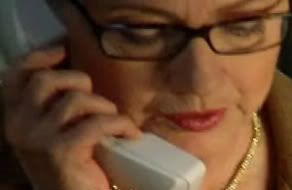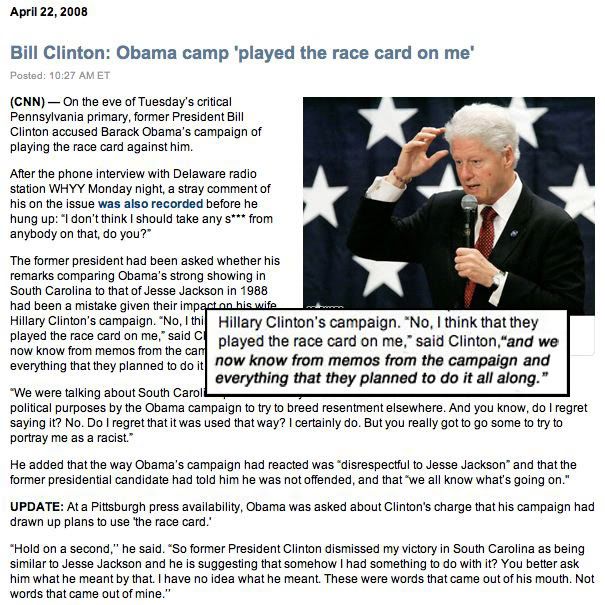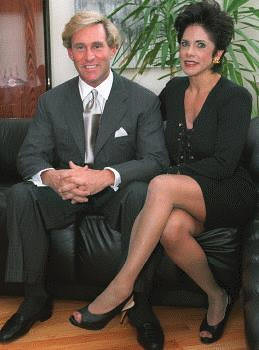
If Hillary Clinton believes that hers is an honest representation and assessment, her fitness for the job of President of the U.S. needs to be questioned.
Kathy Kiely and Jill Lawrence interviewed Hillary Clinton for USA Today:
Hillary Rodham Clinton vowed Wednesday to continue her quest for the Democratic nomination, arguing she would be the stronger nominee because she appeals to a wider coalition of voters — including whites who have not supported Barack Obama in recent contests.
"I have a much broader base to build a winning coalition on," she said in an interview with USA TODAY. As evidence, Clinton cited an Associated Press article "that found how Sen. Obama's support among working, hard-working Americans, white Americans, is weakening again, and how whites in both states who had not completed college were supporting me."
"There's a pattern emerging here," she said.
Clinton's blunt remarks about race came a day after primaries in Indiana and North Carolina dealt symbolic and mathematical blows to her White House ambitions.Can you spot Hillary Clinton's deception in the May 4, 2008 AP article she was citing?:
The Obama campaign, looking toward locking up the nomination, stepped up pressure on superdelegates who have the decisive votes in their race.
In both states, Clinton won six of 10 white voters, according to surveys of people as they left polling places.
Obama spokesman Bill Burton said that in Indiana, Obama split working-class voters with Clinton and won a higher percentage of white voters than in Ohio in March. He said Obama will be the strongest nominee because he appeals "to Americans from every background and all walks of life. These statements from Sen. Clinton are not true and frankly disappointing."
Clinton rejected any idea that her emphasis on white voters could be interpreted as racially divisive. "These are the people you have to win if you're a Democrat in sufficient numbers to actually win the election. Everybody knows that."
Larry Sabato, head of the University of Virginia Center for Politics, said Clinton's comment was a "poorly worded" variation on the way analysts have been "slicing and dicing the vote in racial terms."
However, he said her primary support doesn't prove she's more electable. Either Democrat will get "the vast majority" of the other's primary election votes in a general election, he said.
Clinton lost North Carolina by 14 percentage points and won Indiana by 2 points after competing full-out in both states. She had loaned the campaign $6.4 million in the past month. She said she might lend more.
"We should finish the contests we have and see where we stand after they're over," she said, referring to the six remaining primaries that will end June 3.
There were signs of unrest Wednesday, even among Clinton allies. California Sen. Dianne Feinstein wondered to The Hill, a Capitol Hill newspaper, "whether she can get the delegates that she needs." Former South Dakota senator George McGovern, whose 1972 presidential bid gave Clinton her first political experience, switched his support from Clinton to Obama.
Barack Obama's problem winning votes from working-class whites is showing no sign of going away, and their impression of him is getting worse.Setting aside some serious reservations about the methodology of this poll, it's more than a month old, and it was done before the Pennsylvania primary. Hillary Clinton makes these remarks citing this poll weeks after the Pennsylvania poll, after the Indiana and N. Carolina primaries which she lost.
Those are ominous signals as he hopes for strong performances in the coming week in Indiana and North Carolina primaries that would derail the candidacy of Hillary Rodham Clinton, his rival for the Democratic presidential nomination. Those contests come as his candidacy has been rocked by renewed attention to his volatile former pastor, the Rev. Jeremiah Wright, and by his defeat in last month's Pennsylvania primary.
In an Associated Press-Yahoo News poll in April, 53 percent of whites who have not completed college viewed Obama unfavorably, up a dozen percentage points from November. During that period, the numbers viewing Clinton and Republican candidate John McCain negatively have stayed about even.
Huge preference for Clinton
The April poll — conducted before the Pennsylvania contest — also showed an overwhelming preference for Clinton over Obama among working-class whites. They favored her over him by 39 percentage points, compared to a 10-point Obama lead among white college graduates. Obama also did worse than Clinton among those less-educated voters when matched up against Republican candidate John McCain.
"It's the stuff about his preacher ... and the thing he said about Pennsylvania towns, how they turn to religion," Keith Wolfe, 41, a supermarket food stocker from Parkville, Md., said in a follow-up interview. "I don't think he'd be a really good leader."
Just before the Pennsylvania primary, Obama said many small-town residents are bitter about their lives and turn for solace to religion and guns.
Recent voting patterns underscore Obama's continued poor performance with these voters, who are often pivotal in general election swing states like Florida, Ohio and Pennsylvania.
In Democratic primaries held on or before Super Tuesday, Feb. 5, whites who have not finished college favored the New York senator by a cumulative 59 percent to 32 percent, according to exit polls of voters conducted for The Associated Press and the television networks.
In primaries since Feb. 5, that group has favored Clinton by 64 percent to 34 percent. That includes Ohio and Pennsylvania, in which working-class whites have favored Clinton by 44 and 41 percentage points respectively.
The AP-Yahoo poll shows less educated whites present a problem to Obama in part because of who they are. Besides being poorer, they tend to be older than white college graduates — and Clinton has done strongly with older white voters.
'Lacks content'
Yet political professionals and analysts say more is at play. They blame Obama's problems with blue-collar whites on their greater reluctance to embrace his bid to become the first black president, and his failure to address their concerns about job losses and the battered economy specifically enough.
Terry Madonna, a political science professor at Franklin & Marshall College in Lancaster, Pa., said Obama lost among working-class whites in the state because his message of how this generation's time has come did not address their economic needs.
"While it's incredibly motivating and passionate and compelling, it lacks content," Madonna said. "Hillary would come in and relate to them, talk about the specifics of her policy."
Pennsylvania also illustrated the problems racial attitudes among less educated whites are causing Obama.
In exit polls, one in five of the state's white voters who haven't completed college said race was an important factor in choosing a candidate, about double the number of white college graduates who said so. Eight in 10 of them voted for Clinton over Obama, and only about half said they would vote for Obama over McCain in November.
"The scab is peeled back off," Democratic pollster John Anzalone, not working for either presidential candidate, said of the latest attention focused on Wright and Obama's denunciations of him. In video clips of past sermons, Wright has damned the United States for its history of racism and accused the government of spreading the HIV virus to harm blacks.
Obama pollster Cornell Belcher said that while working-class whites have favored Clinton, the fact that huge numbers of them and other voters have participated in Democratic contests boded well for the November election.
"I don't think there's going to be erosion in the fall of a core group of Democratic voters," Belcher said.
While less educated whites tend to vote less frequently than better educated voters, they are important because of their sheer number.
Exit polls show they have comprised three in 10 voters in Democratic contests so far, a group that cannot be ignored in a contest that has seen Obama maintain a slim lead. They made up 43 percent of all voters in the 2004 presidential contest, when they heavily favored President Bush over Democrat John Kerry.
Underlining his need to connect with these voters, Obama has geared some television ads in Indiana toward economic issues. In recent days he has turned to small events, rather than his trademark huge rallies, concentrating on the economy, including lunching with a blue-collar Indiana family while discussing their problems.
He has let cameras record him playing basketball in hopes of connecting with the passionate fans of the sport who populate Indiana and North Carolina.
The findings from the AP-Yahoo News poll are from interviews with 863 Democrats on a panel of adults questioned in November and April. It has a margin of sampling error of plus or minus 3.3 percentage points.
The poll was conducted over the Internet by Knowledge Networks, which initially contacted people using traditional telephone polling methods and followed with online interviews. People chosen for the study who had no Internet access were given it free.
The exit poll is based on in-person interviews with more than 36,000 voters in 28 states that have held primaries this year in which both candidates actively competed. The margin of sampling error is plus or minus 1 percentage point, larger for some subgroups.


